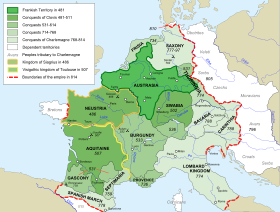Francia
| Kingdom of the Franks | ||||||||||||||||||
| Francia | ||||||||||||||||||
|
||||||||||||||||||
|
Orthographic map of the Frankish Kingdom
|
||||||||||||||||||
|
Diachronic map of the Frankish kingdom
|
||||||||||||||||||
| Capital | ||||||||||||||||||
| Languages | Old Franconian, Latin | |||||||||||||||||
| Religion | Roman Catholicism | |||||||||||||||||
| Government | Monarchy | |||||||||||||||||
| King of the Franks | ||||||||||||||||||
| • | 481–511 | Clovis I | ||||||||||||||||
| • | 613–629 | Clotaire II | ||||||||||||||||
| • | 629–639 | Dagobert I | ||||||||||||||||
| • | 751–768 | Pepin the Younger | ||||||||||||||||
| • | 768–814 | Charlemagne | ||||||||||||||||
| Historical era | Middle Ages | |||||||||||||||||
| • | Established | 481 | ||||||||||||||||
| • | Clovis I crowned first King of the Franks | 496 | ||||||||||||||||
| • | Charlemagne crowned Holy Roman Emperor | December 25, 800 | ||||||||||||||||
| • | Treaty of Verdun | 843 | ||||||||||||||||
| Area | ||||||||||||||||||
| • | 814 est. | 1,200,000 km² (463,323 sq mi) | ||||||||||||||||
| Currency | Denier | |||||||||||||||||
|
||||||||||||||||||
| Today part of | see list. | |||||||||||||||||
Francia or Frankia, also called the Kingdom of the Franks (Latin: Regnum Francorum), Frankish Kingdom, Frankish Empire, Frankish Realm or occasionally Frankland, was the territory inhabited and ruled by the Franks, a confederation of West Germanic tribes, during Late Antiquity and the Early Middle Ages.
The kingdom was founded by Clovis I, crowned first King of the Franks in 496. Under the nearly continuous campaigns of Pepin of Herstal, Charles Martel, Pepin the Younger, Charlemagne, and Louis the Pious—father, son, grandson, great-grandson and great-great-grandson—the greatest expansion of the Frankish empire was secured by the early 9th century.
The tradition of dividing patrimonies among brothers meant that the Frankish realm was ruled, nominally, as one polity subdivided into several regna (kingdoms or subkingdoms). The geography and number of subkingdoms varied over time, but the particular term Francia came generally to refer to just one regnum, that of Austrasia, centred on the Rhine and Meuse rivers in northern Europe. Even so, sometimes the term was used as well to encompass Neustria north of the Loire and west of the Seine.
Eventually, the singular use of the name Francia shifted towards Paris, and settled on the region of the Seine basin surrounding Paris, which still today bears the name Île-de-France and gave its name to the entire Kingdom of France. Most Frankish Kings were buried in the Basilica of Saint Denis, near Paris. Modern France is still named Francia in Spanish and Italian as well as Frankreich in German and Frankrijk in Dutch.
...
Wikipedia


